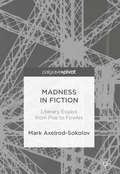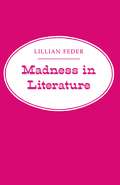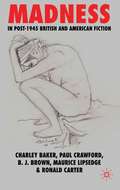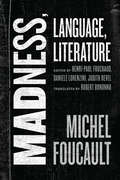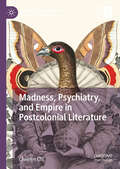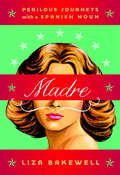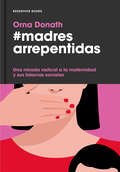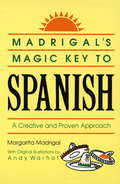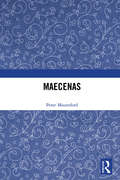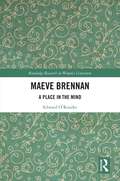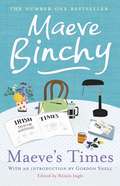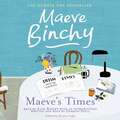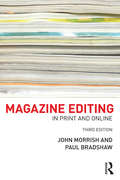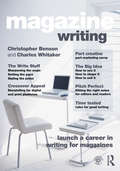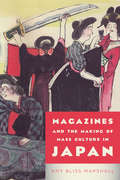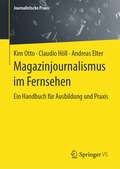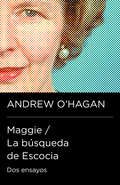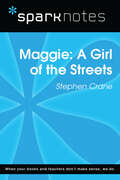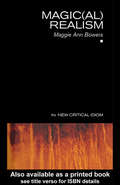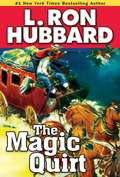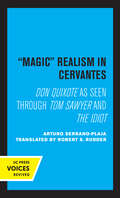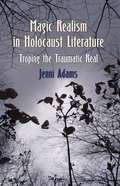- Table View
- List View
Madness in Fiction: Literary Essays from Poe to Fowles
by Mark Axelrod-SokolovThis book examines one work dealing with madness from each of five prominent authors. Including discussion of Fowles, Hamsun, Hesse, Kafka, and Poe, it delineates the specific type of madness the author associates with each text, and explores the reason for that - such as a historical moment, physical pressure (such as starvation), or the author’s or his narrator’s perspective. The project approaches the texts it explores from the perspective of a writer of fiction as well as from the perspective of a critic, and discusses them as unique manifestations of literary madness. It is of particular significance for those interested in the interplay of fiction, literary criticism, and psychology.
Madness in Literature
by Lillian FederTo probe the literary representation of the alienated mind, Lillian Feder examines mad protagonists of literature and the work of writers for whom madness is a vehicle of self-revelation. Ranging from ancient Greek myth and tragedy to contemporary poetry, fiction, and drama, Professor Feder shows how literary interpretations of madness, as well as madness itself, reflect the very cultural assumptions, values, and prohibitions they challenge.
Madness in Post-1945 British and American Fiction
by Ronald Carter Charley Baker Paul Crawford B. J. Brown Maurice LipsedgeA comprehensive and thematic exploration of representations of madness in postwar British and American Fiction, this book is relevant to those with interests in literary studies and is a vital read for psychiatric clinicians and professionals who are interested in how literature can inform and enhance clinical practices.
Madness, Language, Literature (The Chicago Foucault Project)
by Michel FoucaultNewly published lectures by Foucault on madness, literature, and structuralism. Perceiving an enigmatic relationship between madness, language, and literature, French philosopher Michel Foucault developed ideas during the 1960s that are less explicit in his later, more well-known writings. Collected here, these previously unpublished texts reveal a Foucault who undertakes an analysis of language and experience detached from their historical constraints. Three issues predominate: the experience of madness across societies; madness and language in Artaud, Roussel, and Baroque theater; and structuralist literary criticism. Not only do these texts pursue concepts unique to this period such as the “extra-linguistic,” but they also reveal a far more complex relationship between structuralism and Foucault than has typically been acknowledged.
Madness, Psychiatry, and Empire in Postcolonial Literature (Palgrave Studies in Literature, Science and Medicine)
by Chienyn ChiMadness, Psychiatry, and Empire in Postcolonial Literature provides a comparatist interrogation of empire through archives of history, science, and literature. The book analyzes Aimé Césaire’s Discourse on Colonialism to shed light on Césaire’s critique of psychological and medical discourses of the colonized’s mind. The book argues that the discourse of psychiatry, psychology, and psychoanalysis has erased the context of power in global histories of empire. Through the book’s chapters, Chi analyzes Lu Xun’s “A Madman’s Diary,” Virginia Woolf’s Mrs. Dalloway, and Tsitsi Dangarembga’s Nervous Conditions to assert that the misapprehension of madness should not automatically be accepted as the history of an isolated Western culture but rather that of the history of imperialism—a globalizing process that silences alternative cultural conceptions of the mind, of madness, and of behavior, as well as different interpretations of madness.
Madre: Perilous Journeys with a Spanish Noun
by Liza BakewellWhy is the word madre, "mother," so complicated in Spanish--especially in Mexico? Leaping off the page with energy, insight, and attitude, Liza Bakewell's exploration of language is anything but "just semantics." Why does me vale madre mean worthless, while !qué padre! means fabulous, she asks? And why do one hundred madres disappear when one padre enters the room, converting the group from madres to padres? Thus begins a journey through Mexican culture in all its color: weddings, dinner parties, an artist's studio, heart-stopping taxi rides, angry journalists, corrupt politicians, Blessed Virgins, and mothers both sacred and profane. Along the way, a reader discovers not only an invaluable lexicon of Mexican slang (to be used with caution or not at all) but also thought-provoking reflections on the evolution of language; its winding path through culture, religion, and politics; and, not least, what it means--and what it threatens--to be a creative female, a madre.
Madres arrepentidas: Una mirada radical a la maternidad y sus falacias sociales
by Orna DonathAman a sus hijos, pero se arrepienten de ser madres. #madresarrepentidas es un tratado de pensamiento radical que no dejará indiferente a nadie. #madresarrepentidas pone sobre la mesa algo de lo que apenas se habla: las muchas mujeres que, una vez han sido madres, no han encontrado la «profetizada» plenitud. Aman a sus hijos por a su vez no quieren ser madres de nadie. En este ensayo controvertido, tan minucioso como iluminador, la socióloga Orna Donath examina la dimensión del tabú, desactiva los dictados sociales y deja que sean las propias madres quienes hablen de sus experiencias. Así, #madresarrepentidas se erige como un nuevo e imprescindible manifiesto feminista, llamado a romper barreras. Críticas:«Donath pone sobre la mesa el debate sobre un tabú, una realidad negada y fruto en buena parte de la presión social que se pone a las mujeres.»Cristina Sen, La Vanguardia «Orna Donath defiende a estas mujeres contritas de un amplio abanico de ataques. Por una parte, de los que les llegan desde Israel, de tono radical y discurso atávico, escudándose en "lo natural" para decidir qué es bueno y qué es malo. Pero también las defiende de ciertas voces europeas, más sutiles, que huyen del discurso moralizante y sin embargo no dudarían en recetar todo tipo de tratamientos a estas madres por sus lamentables pecados.»Neue Zücher Zeitung «Ser madre en una sociedad que infravalora la maternidad, y que ni educa ni ama bien a los niños y a sus progenitoras, es algo tremendamente duro que puede llevar al arrepentimiento.»Paloma Pedrero, La razón «Un ensayo más que polémico y que quiere [...] derribar uno de los tabúes más inamovibles: que todas las mujeres han venido al mundo para ser madres y disfrutar con la maternidad.»Miguel Lorenci, Diario de Navarra «Con suensayo, Donath ha sacado a la luz pública lo que hasta ahora se mencionaba únicamente en charlas entre amigas o durante procesos de terapia.»Der Spiegel «Con su estudio sobre las mujeres que se arrepienten de haber aceptado el rol de madres, la socióloga israelí Orna Donath ha golpeado un avispero formidable.»Die Welt «Lo que en origen era una investigación, destinada a círculos académicos, que analizaba territorios inexplorados de la maternidad, ha escapado del ámbito especializado para dar la vuelta al mundo. Desde Jerusalén, la chispa prendió en Noruega, Suecia, Finlandia, Austria y Estonia. Pero ha sido en Alemania donde ha arrasado. Desde hace meses no hay día en que no se trate el tema, a todos los niveles, desde las revistas culturales más prestigiosas a los foros y redes sociales.»La Repubblica
Madrigal's Magic Key to Spanish: A Creative and Proven Approach
by Margarita MadrigalUse the English you already know to quickly learn the basics of Spanish with this unique, accessible guide featuring original illustrations by Andy Warhol—from one of America&’s most prominent language teachers. Read, write, and speak Spanish in only a few short weeks! Even the most reluctant learner will be astonished at the ease and effectiveness of Margarita Madrigal&’s unique method of teaching a foreign language. Completely eliminating rote memorization and painfully boring drills, Madrigal&’s Magic Key to Spanish is guaranteed to help you:• Learn to speak, read, and write Spanish quickly and easily• Convert English into Spanish in an instant• Start forming sentences after the very first lesson• Identify thousands of Spanish words within a few weeks of study• Travel to Spanish-speaking countries with confidence and comfort• Develop perfect pronunciation, thanks to a handy pronunciation keyWith original black-and-white illustration by Andy Warhol, Madrigal&’s Magic Key to Spanish will provide readers with a solid foundation upon which to build their language skills.
Maecenas
by Peter MountfordWhile much has been written of the importance of Agrippa in Augustus’ rise to power as the first emperor of Rome, Maecenas remains a shadowy figure despite being a vital part in the success of Augustus. After the assassination of Julius Caesar, Maecenas was a vital negotiator between Octavian and Mark Antony in the years leading up to the battle of Actium, and a wise political advisor to Augustus during the early years of the new regime. This is the first biography of Maecenas in English and gives due credit to the stature of Maecenas both as a confidant of the emperor and as patron of the poets Virgil, Horace and Propertius. The book devotes a chapter to each poet’s relationship with Maecenas and the Augustan regime: the chapter on Virgil, while considering his relationship to Maecenas and Augustus, argues that the origins of his choice of Aeneas may lie in Etruria rather than elsewhere, while the chapter on Horace assesses one of the closest documented relationships of Roman history. The chapter on Propertius wrestles with the disparate views of scholars on the question of his relationship with the Augustan regime and argues that, at heart, he remains an Umbrian/Etruscan rather than a Roman. A crucial feature of the book is the provision of 161 texts from ancient Roman and Greek authors which mention Maecenas. Based on sustainable evidence this study of the importance of Maecenas takes scholarship in new and important directions.
Maeve Brennan: A Place in the Mind (Routledge Research in Women's Literature)
by Edward O’RourkeThis book explores the intricate interplay between physical spaces and psychological landscapes in the works of Irish-American author Maeve Brennan. Brennan’s writing is now classed amongst the most important of twentieth-century Irish women’s fiction, having undergone a significant reclamation and reappraisal in the 30 years since her death. Single and childfree for most of her life, Brennan eschewed the securities of family and home, experiencing an "otherness" that she shared with her fellow New Yorkers, many of them left, she wrote, hanging on to a city half-capsized––“most of them still able to laugh as they cling to the island that is their life’s predicament.” It is a suitably ambiguous expression for a writer who cultivated an interstitial existence, whose stories inhere within a dream cycle of reiterative pasts, and whose works augment and elevate the canon of radical Irish fiction.
Maeve's Times
by Maeve Binchy'Maeve's Times is funny and clever and kind, which are excellent qualities in both books and people' Irish Times'As someone who fell off a chair not long ago trying to hear what they were saying at the next table in a restaurant, I suppose I am obsessively interested in what some might consider the trivia of other people's lives.'Maeve Binchy is well known for her bestselling novels, but for many years Maeve was a journalist. From 'The Student Train' to 'Plane Bores' and 'Bathroom Joggers' to 'When Beckett met Binchy', these articles have all the warmth, wit and humanity of her fiction. Arranged in decades, from the 1960s to the 2000s, and including Maeve's first and last ever piece of writing for the Irish Times, the columns also give a fascinating insight into the author herself.With an introduction written by her husband, the writer Gordon Snell, this collection of timeless writing reminds us of why the leading Irish writer was so universally loved.
Maeve's Times
by Maeve Binchy'Maeve's Times is funny and clever and kind, which are excellent qualities in both books and people' Irish Times'As someone who fell off a chair not long ago trying to hear what they were saying at the next table in a restaurant, I suppose I am obsessively interested in what some might consider the trivia of other people's lives.'Maeve Binchy is well known for her bestselling novels, but for many years Maeve was a journalist. From 'The Student Train' to 'Plane Bores' and 'Bathroom Joggers' to 'When Beckett met Binchy', these articles have all the warmth, wit and humanity of her fiction. Arranged in decades, from the 1960s to the 2000s, and including Maeve's first and last ever piece of writing for the Irish Times, the columns also give a fascinating insight into the author herself.With an introduction written by her husband, the writer Gordon Snell, this collection of timeless writing reminds us of why the leading Irish writer was so universally loved.
Maeve's Times
by Maeve BinchyAs someone who fell off a chair not long ago trying to hear what they were saying at the next table in a restaurant, I suppose I am obsessively interested in what some might consider the trivia of other people's lives.'Maeve Binchy is well-known for her bestselling novels, the most recent of which was A WEEK IN WINTER. But for many years Maeve was a journalist, writing for the IRISH TIMES. From 'The Student Train' to 'Plane Bores' and 'Bathroom Joggers' to 'When Beckett met Binchy', these articles have all the warmth, wit and humanity of her fiction. Arranged in decades, from the 1960s to the 2000s, and including Maeve's first and last ever piece of writing for the IRISH TIMES, the columns also give a fascinating insight into the author herself.With an introduction written by her husband, the writer Gordon Snell, this collection of timeless writing reminds us of why the leading Irish writer was so universally loved.Read by Kate Binchy(p) 2013 Orion Publishing Group
Mafia Movies
by Dana RengaRico 'Little Caesar' Bandello, Michael Corleone, and Tony Soprano are just some of the onscreen mafia figures that have fascinated audiences since cinema's inception. Portrayals of the Italian and Italian-American mafia, though, have differed markedly over time and across multiple cultures--from the Godfather trilogy to contemporary Italian films, and in works both by established producers like Martin Scorsese and emerging directors like Matteo Garrone.Mafia Movies encourages mafia aficionados to explore the rich variety of classics and rarities within the genre with provocative analyses of over forty films. The essays in this volume provide a comprehensive exploration of the myth of the mafia onscreen, identifying key features and connections to styles such as film noir, thrillers, and even westerns. Mafia Movies also questions whether there are uniquely American or Italian ways of depicting the mafia, exploring how filmmakers from both countries have approached the subject in divergent ways.
Magazine Editing: In Print and Online
by Paul Bradshaw John MorrishIncluding comprehensive coverage on both print and online, consumer and free magazines, Magazine Editing looks at how magazines work and explains the dual role of the magazine editor. John Morrish and Paul Bradshaw consider the editor both as a journalist, having to provide information and entertainment for readers, and as a manager, expected to lead and supervise successfully the development of a magazine or periodical. Looking at the current state of the magazine market in the twenty-first century, the third edition explains how this has developed and changed in recent years, with specific attention paid to the explosion of apps, e-zines, online communities and magazine websites. Featuring case studies, interviews with successful editors, examples of covers and spreads, and useful tables and graphs, this book discusses the editor’s many roles and details the skills needed to run a publication. Magazine Editing offers practical guidance on: how to create an editorial strategy how to lead and manage an editorial team researching a market and finding new readers dealing with budgets and finance working with designers and production staff legal, technological and ethical dilemmas online distribution, social media and search engine optimisation managing information overload how to become an editor.
Magazine Writing
by Christopher D. Benson Charles F. WhitakerWhat does it take to launch a career writing for magazines? In this comprehensive, up-to-date introduction to magazine writing, students will learn everything from the initial story pitch all the way through to the final production, taking with them the essential tools and skills they will need for today's rapidly changing media landscape. Written by a team of experienced writers and editors, Magazine Writing teaches the time-tested rules for good writing alongside the modern tools for digital storytelling. From service pieces to profiles, entertainment stories and travel articles, it provides expert guidance on topics such as: developing saleable ideas; appealing to specific segments of the market; navigating a successful pitch; writing and editing content for a variety of areas, including service, profiles, entertainment, travel, human interest and enterprise Chock full of examples of published works, conversations with successful magazine contributors and bloggers, and interviews with working editors, Magazine Writing gives students all the practical and necessary insights they need to jumpstart a successful magazine writing career.
Magazines and the Making of Mass Culture in Japan (Studies in Book and Print Culture)
by Amy Bliss MarshallMagazines & the Making of Mass Culture in Japan provides a detailed yet approachable analysis of the mechanisms central to the birth of mass culture in Japan by tracing the creation, production, and circulation of two critically important family magazines, Kingu (King) and Ie no hikari (Light of the Home). These magazines served to embed new instruments of mass communication and socialization within Japanese society and created mechanisms to facilitate the dissemination of hegemonic forms of discourse in Japan in the first half of the twentieth century. The amazing success of Kingu and Ie no hikari during the 1920s and 1930s not only established and normalized participation in a Japanese mass national audience - a community which had previously not existed - but also facilitated the rise of Japanese mass consumer culture in the postwar years. Amy Bliss Marshall argues that the postwar mass Japanese national consumer is foreshadowed by the mass national audience created by family magazines of the interwar era. This book analytically narrates the creation and development of such publications, one explicitly capitalist and one outwardly agrarian, based on missions with an overarching desire to create a mass Japanese magazine audience. Magazines & the Making of Mass Culture in Japan highlights the importance of the seemingly innocuous acts of mass, leisure consumption of magazines and the goods advertised therein, thus aiding our understanding of the creation and direction of a new form of social participation and understanding - an essential part of not only the culture but also the politics of the transwar period.
Magazinjournalismus im Fernsehen: Ein Handbuch für Ausbildung und Praxis (Journalistische Praxis)
by Kim Otto Claudio Höll Andreas ElterDas Trainingshandbuch Magazinjournalismus Fernsehen gibt Journalismusstudierenden und Journalistinnen und Journalisten einen Leitfaden zur Produktion eines Fernsehmagazinbeitrags an die Hand. Mit Praxisbeispielen wird gezeigt, wie Magazinjournalismus gelingt, der seine Zuschauer bannt und informiert und so Teil der öffentlichen Debatte wird. Das Trainingshandbuch fokussiert sich auf die Praxis: Von der Themenrecherche über Interviewtechniken bis zum fertigen Beitrag begleitet das Buch Sie in allen Schritten zu Ihrem Fernsehmagazinbeitrag.
Maggie / La búsqueda de Escocia: Dos ensayos (Colección Endebate #Volumen)
by Andrew O'HaganUno de los mejores escritores británicos en activo nos brinda dos fabulosos ensayos: uno sobre Thatcher y otro sobre Escocia. La muerte de Margaret Thatcher, el 8 de abril de 2013, tuvo dos consecuencias inmediatas: puso fin a la era que sus políticas habían inaugurado y reabrió las profundas heridas que su ejercicio del poder había causado en la sociedad británica. En «Maggie» Andrew O'Hagan, cuya adolescencia coincidió con los gobiernos de Thatcher, reflexiona sobre una figura tan polémica como trascendental para la historia del siglo XX. En «En busca de Escocia», el ensayo que lo acompaña, O'Hagan, nacido en Glasgow, realiza un ejercicio de autocrítica sobre el nacionalismo.
Maggie: A Girl of the Streets (SparkNotes Literature Guide Series)
by SparkNotesMaggie: A Girl of the Streets (SparkNotes Literature Guide) by Stephen Crane Making the reading experience fun! Created by Harvard students for students everywhere, SparkNotes is a new breed of study guide: smarter, better, faster. Geared to what today's students need to know, SparkNotes provides: *Chapter-by-chapter analysis *Explanations of key themes, motifs, and symbols *A review quiz and essay topicsLively and accessible, these guides are perfect for late-night studying and writing papers
Magic (The New Critical Idiom)
by Maggie Ann BowersBestselling novels by Angela Carter, Salman Rushdie, Gabriel Garcia Marquez and a multitude of others have enchanted us by blurring the lines between reality and fantasy. Their genre of writing has been variously defined as 'magic', 'magical' or 'marvellous' realism and is quickly becoming a core area of literary studies. This guide offers a first step for those wishing to consider this area in greater depth, by: exploring the many definitions and terms used in relation to the genre tracing the origins of the movement in painting and fiction offering an historical overview of the contexts for magic(al) realism providing analysis of key works of magic(al) realist fiction, film and art. This is an essential guide for those interested in or studying one of today's most popular genres.
Magic Licking Lollipops: Targeting the l Sound (Speech Bubbles 2)
by Melissa PalmerLynn and Lily love licking lollipops, and lollies of all colours, shapes and sizes. But this time, have they bitten off more than they can chew? This picture book targets the /l/ sound and is part of Speech Bubbles 2, a series of picture books that target specific speech sounds within the story. The series can be used for children receiving speech therapy, for children who have a speech sound delay/disorder, or simply as an activity for children’s speech sound development and/or phonological awareness. They are ideal for use by parents, teachers or caregivers. Bright pictures and a fun story create an engaging activity perfect for sound awareness. Picture books are sold individually, or in a pack. There are currently two packs available – Speech Bubbles 1 and Speech Bubbles 2. Please see further titles in the series for stories targeting other speech sounds.
Magic Quirt, The
by L. Ron HubbardWelcome to the wild, wild west. Old Laramie, cook for the cowpunchers at the Lazy G Ranch, happens to be in the right place at the right time to stop bandits from attacking a Spanish-speaking family with Aztec roots. The family offers Laramie a silver-mounted quirt as thanks, telling him the small horsewhip will make him a big man.Though he'd never really thought of himself as anything other than old, Laramie accepts the idea that the mysterious quirt holds special Aztec magic; in fact, he thinks, with the quirt in his hands, he's now invincible. To prove this claim, Laramie sets out on a series of adventures showing that the quirt has given him extraordinary newfound bravery and skill--or has it? ALSO INCLUDES THE WESTERN STORIES "VENGEANCE IS MINE!" AND "STACKED BULLETS""...is pure entertainment from first page to last with that L. Ron Hubbard touch giving this tale an enduring reading engagement from beginning to end."--Midwest Book Review
Magic Realism in Cervantes: Don Quixote as Seen Through Tom Sawyer and The Idiot
by Arturo Serrano-PlajaThis title is part of UC Press's Voices Revived program, which commemorates University of California Press’s mission to seek out and cultivate the brightest minds and give them voice, reach, and impact. Drawing on a backlist dating to 1893, Voices Revived makes high-quality, peer-reviewed scholarship accessible once again using print-on-demand technology. This title was originally published in 1970.
Magic Realism in Holocaust Literature
by Jenni AdamsA major contribution to Holocaust studies, the book examines the capacity of supernatural elements to dramatize the ethical and representational difficulties of Holocaust fiction. Exploring texts by such writers as D. M. Thomas and Markus Zusak it will appeal to scholars and students of Holocaust literature, magic realism, and contemporary fiction.
